- Home
- Robert Goddard
The Ways of the World Page 5
The Ways of the World Read online
Page 5
Appleby pushed the door open and they followed him in. Four dormer windows facing the street lit a long, dust-moted chamber crammed with old furniture, packing-boxes and trunks. Most of the articles were stacked along the inner wall, where the ceiling was highest, allowing easy access to the windows. Appleby closed the door carefully behind them and crossed to one of the windows. He opened it, startling a pigeon outside, which took off in a burst of flapping wings that caused Fradgley to jump. He for one was not at ease. That was painfully clear.
‘This window corresponds to the position on the pavement where Sir Henry was found,’ said Appleby. ‘There’s also an accumulation of sludge and mud in the gutter behind the parapet in which the police discovered a boot print matching Sir Henry’s footwear. So, there’s no doubt it was from here that he fell.’
‘Perhaps I could take a look,’ said Max, sensing that Ashley was in no hurry to. Appleby stepped aside for him. Max hooked the window open as wide as it would go and leant out. The tiled roof sloped down from the window, as Appleby had described, to a leaded gutter behind a low brick parapet. There appeared to be numerous different boot prints in the silt clogging the gutter, mostly filled with rainwater.
‘I’m afraid French policemen are no lighter-footed than their British counterparts, Mr Maxted,’ said Appleby. ‘There’s also been quite a lot of rain since Friday night. But Zamaron tells me a good plaster cast of Sir Henry’s boot print was obtained. The actual print, alas, is no longer visible.’
That was either convenient or inconvenient, Max supposed, depending on your point of view. ‘How does Zamaron suggest my father climbed through the window? It would have been quite a scramble.’
‘There was a chair in front of the window. One of those, I believe.’ Appleby pointed to a stack of plain deal chairs. ‘He could simply have stepped out.’
‘Then I believe I’ll do the same.’
‘Would you fetch him a chair, Mr Fradgley?’ Appleby asked, apparently unsurprised.
Carrying furniture, for however short a distance, did not appear to agree with Fradgley. But he did as he had been asked.
‘Is this really necessary?’ Ashley put in. ‘It seems clear enough how Pa got on to the roof, James.’
‘But not why.’
Ashley’s expression signalled strongly that he was not sure he wanted to know why. But his own diffidence embarrassed him. It was a legitimate question.
Apparently taking pity on him, Appleby said, ‘Commissioner Zamaron is in possession of information that may point to an explanation, Sir Ashley.’
‘The information is not altogether edifying,’ said Fradgley.
‘I think we’d better hear it, even so,’ Max responded, drawing a reluctant nod of approval from his brother.
‘Very well.’ Appleby smiled grimly. ‘We’re all men of the world, I trust. I’m obliged to speak plainly. According to the concierge, Sir Henry regularly visited a war widow, one Madame Dombreux, who occupies an apartment on the third floor. Madame Dombreux told the concierge she was giving Sir Henry French lessons.’
‘French lessons?’ Ashley spluttered. ‘But …’
‘How old is Madame Dombreux?’ Max enquired calmly.
‘Like many war widows, Mr Maxted, she is not old at all. I haven’t met her myself. Zamaron described her as … très jolie.’
‘Good God,’ murmured Ashley.
‘Also like many war widows, Madame Dombreux must support herself as best she can. She has a poorly paid job in the ticket office at Montparnasse station. It wouldn’t be surprising if she sought to … supplement her income.’
‘By giving French lessons.’
‘Exactly so.’
‘In the evening, no doubt.’
‘No doubt.’
‘This is disgusting,’ Ashley grumbled.
‘It may not be, Sir Ashley,’ said Fradgley. ‘It could all be entirely above board.’
‘So it could,’ Appleby agreed. ‘The fact is that Sir Henry called here frequently. That much we know for certain.’
‘But I don’t imagine he frequently went on to the roof,’ said Max. ‘Does Zamaron have an explanation for that?’
Appleby sighed. ‘He does.’
‘Which we aren’t going to find palatable either?’
‘I’m afraid not. Zamaron’s responsible for overseeing foreign residents in Paris. Hence his involvement in this matter. He happens to know that the attic room in the building opposite is the studio of an Italian artist named Spataro. Zamaron knows a lot of artists. He seems to fancy himself as something of a connoisseur, as you’ll see later. He believes Madame Dombreux sometimes models for Spataro. Make of that what you will. What he makes of it is that Sir Henry may have suspected she did rather more than pose for Spataro and that he went on to the roof on Friday night in order to spy on them, then … slipped.’
Ashley groaned and gave ground. ‘We certainly can’t relay such a story to our mother, Mr Appleby. It would be … impossible.’
‘Then I suggest you invent a more acceptable alternative.’
‘The commissioner’s lurid speculations will form no part of any official conclusion on the circumstances of your father’s death, Sir Ashley,’ said Fradgley. ‘You may rest assured of that.’
‘Is Madame Dombreux likely to be at home at this hour, gentlemen?’ Max enquired.
‘Most likely not,’ Appleby replied. ‘And, frankly, I’m not sure what you’d gain by speaking to her.’
‘We don’t want to speak to her,’ Ashley declared, apparently believing it was for him to declare their wishes in such matters.
Max had already decided he would speak to the woman with or without Appleby’s assistance. He did not bother to contradict his brother, but turned back to the window.
He could see at a glance that the parapet blocked the view of the attic of the building opposite. Out on the roof it would be a different matter, of course. To that extent, Zamaron’s theory was sound enough. ‘I believe I’ll take that look outside even so,’ he announced in a deliberately nonchalant tone. ‘Since we’re here.’
He stepped up on to the chair and out through the open window. It was quite a stretch down to the gutter. It was not difficult to imagine his father taking a fatal misstep out there at night.
Max steadied himself against the roof and stood upright. Paris stretched grey and smoke-wreathed around him. There was the Eiffel Tower away to his right. Below, a tram was clattering round a curve in the tracks in Carrefour Vavin. And directly opposite were the windows of the attic Sir Henry had supposedly climbed out there to see into. Max could not make out much of the interior. The windows were uncurtained but dirty. Something that might have been an easel draped in a sheet stood at one end of the room. Rectangular, stacked shapes that could have been paintings were also visible. Beyond that … nothing.
If Spataro fulfilled the archetype of a Montparnasse artist, he was probably asleep. At night, with lights burning within, it could have been very different. Had his father seen what he had feared he would see? Or worse than he had feared? Shock could have played its part in the disaster that overtook him. If so, it was a pitiful end.
The cooing of a pigeon close by drew Max’s attention to the chimney-stack behind him. He turned and glanced up at the bird, perched by one of the pots. The stack formed part of a wall supporting it and chimneys of the next building. Max noticed there were skylights set in the roof just below the apex, serving a second attic above the one he had just emerged from.
At that moment, a pale glimmer of sunlight pierced the prevailing gloom and was reflected off the rain-slicked roof. Something sparkled in Max’s field of view and he realized there were fragments of broken glass scattered across the tiles immediately below the nearest skylight. Then he saw that one of the panes in the skylight was broken. How had that come about? he wondered. How – and when?
Grasping the wooden finial above the window, he hauled himself up past the dormer roof.
‘Where are you go
ing, Mr Maxted?’ Appleby called, leaning out to follow his progress.
‘There’s a broken window up here.’
‘One of the policemen probably put his boot through it. They’re a clumsy lot. Watch your step, now.’
‘I will, I will.’
Max doubted if any of the police had climbed up to the skylight. It was an awkward scramble, with little available in the way of foot- or hand-holds. One wrong move and Max could conceivably go the way of his father. A glance behind him was hardly reassuring.
But flying over the battlefields of Flanders in wire-and-canvas biplanes had immunized him against vertigo. He made it to the skylight with nothing worse than a few short slips to show for it. A hole had certainly been punched in one of the panes. A piece of wood had been nailed beneath the remnants of the pane to keep the weather out. It was obvious no policeman’s boot was responsible for the damage, however. The fragments of glass on the roof proved the skylight had been broken from inside, not outside. It was puzzling – very puzzling.
He peered down through the undamaged pane into a cramped roof space. The boarded floor he could see below was thick with dust, pierced in places by assorted footprints. The footprints themselves were entirely free of dust. They had clearly been made recently – probably no longer ago than Friday.
A fatal accident in the circumstances envisaged by Commissioner Zamaron was plausible, he could not deny. But there were enough oddities and inconsistencies to suggest that something else might have happened, though what that might be he could not yet imagine. He needed to learn more. And he would, whatever Ashley said.
He slithered back down to the attic window and cast another glance towards Spataro’s studio. There was still no movement there. It struck Max that if anyone had seen what happened to Sir Henry, it could only be Spataro. He would have had a perfect view – if he had been looking.
‘Seen enough, Mr Maxted?’ Appleby called.
‘Quite enough, thank you.’ Max clambered back in through the window and brushed himself down.
‘Satisfied?’ Ashley asked sharply, frowning at him ominously.
‘I believe I am, yes.’
‘Then perhaps we should be going.’
They left the attic, Appleby locking up carefully behind them, and headed for the lift. As they reached it, Ashley said suddenly, ‘No sense our cramming in there again like sardines. You go ahead, gentlemen. My brother and I will walk down.’
Ashley brushed aside Fradgley’s offer to give up his place in the lift. Appleby made no such offer. The expression on his face suggested he knew, as did Max, that Ashley had decided a quiet word between brothers was now in order.
The lift groaned and clanked arthritically down its wire shaft as Ashley and Max began a slow descent of the stairs. Max lit a cigarette and waited for Ashley to declare his position. He did not have to wait long.
‘I was afraid it would be something like this, you know. Falling to his death while spying on some tart he’d become besotted with. I mean to say, it’s pathetic.’
‘You seem to be assuming it’s true.’
‘Of course it’s true. How else do you explain a man of Pa’s age prancing around on a roof in the middle of the night?’
‘I don’t. Yet. But perhaps we should speak to Madame Dombreux before we make our minds up.’
‘Absolutely not. Give her the slightest encouragement and she’ll be trying to blackmail us.’
‘With what?’
‘I don’t know. Billets doux Pa was stupid enough to send her, perhaps.’
‘But—’
‘Listen to me very carefully, James. I don’t want any word of this – any breath – to reach Mother.’
‘Neither do I, if Zamaron’s version of events is correct.’
‘It’s obviously correct. Fortunately, no one has any interest in bringing those events to public attention. Appleby and Fradgley are trying to avoid embarrassing our delegation here. And it sounds as if this fellow Zamaron has been told to help them do that. So, we must do everything we can to cooperate with them. Don’t ask any challenging questions. And don’t look down your nose in that way you have that implies you don’t believe a single thing you’re being told.’
‘Look down my nose? I never—’
‘If you want to make yourself useful, think of something we can tell Mother that will go some way towards accounting for what happened to Pa without mentioning this Dombreux woman.’
‘I’ll do my best.’
‘You’d better. Pa’s left us a truly horrible mess to clear up. It can be done. But only if we stick together. I need your support, James. Your loyalty to our family.’ Ashley looked round at him as he traversed the next landing. ‘Can I be assured of it?’
‘Of course you can.’
‘Good. I’m glad to hear it.’
No doubt he was. But Max was aware that their definitions of family loyalty did not necessarily coincide. In the end, Max would abide faithfully by his definition, not Ashley’s. He understood himself well enough to know that it could be no other way.
POLICE HEADQUARTERS ON the Île de la Cité was a massive old mansarded building facing Notre-Dame. It was so noisy and crowded that it was hard to tell who among the gabbling, form-flapping throng might be police officers, complainants or suspected criminals. Max for one was glad of a guide through the maze of narrow corridors and echoing stairways. It was clearly not Appleby’s first visit to the premises. The several greetings he exchanged along the way suggested he was a regular caller.
This was confirmed when they reached the relative haven of Commissioner Zamaron’s office. He was a small, wiry, moustachioed man, with a mop of suspiciously dark hair and a policemanly combination of affability and perceptiveness. Disarmingly, he and Appleby were on first-name terms – ‘Bonjour, Horace,’ and ‘Good morning, Léon,’ no less.
Appleby had alerted them to Zamaron’s supposed connoisseurship and it was immediately apparent. Paintings covered the walls – landscapes, still lifes and portraits in contrasting styles. Were they payments in kind for favours done? Max wondered. He could not resist whispering to Ashley, ‘I expect he keeps the nudes at home.’ Ashley pretended not to hear him.
There had been a telephone call for Fradgley from the Embassy, Zamaron reported in his very passable English. Fradgley took himself off to return the call.
That left Zamaron to offer Max and Ashley coffee, condolences and his personal assurances of discretion and dutifulness. ‘Horace has told you what I believe occurred, messieurs? Très bien. We do not need to speak more of it. A tragic accident is a tragic accident. Everything is arranged. The, er … travail administratif … has been dealt with.’
‘He means the paperwork’s in place, gentlemen,’ said Appleby. ‘When will they be able to take Sir Henry’s body back to England, Léon?’
‘Whenever you wish. Tomorrow?’
‘That would suit us very well,’ said Ashley. ‘We’re very grateful for your … expeditiousness.’
‘Think nothing of it.’
‘The paperwork,’ Ashley pressed, ‘will include a death certificate, I take it?’
‘But of course. One has already been sent from the Mairie to the Embassy. No doubt Monsieur Fradgley is being told of this by his office.’
‘And what does it state as the cause of death?’
‘The cause of death?’
‘French death certificates don’t necessarily specify one, Sir Ashley,’ said Appleby with a smile.
‘Really?’ Max put in.
Appleby’s smile broadened. ‘Really.’
‘Sir Henry’s possessions – those found on him – I have here.’ Zamaron opened a drawer in his desk and took out a bulging manilla envelope. ‘You will want to have them.’
‘Indeed,’ said Ashley gravely.
‘I regret I must ask you to sign a receipt.’
Zamaron’s doleful expression implied his regret was genuine. Max could not but admire the man’s delicacy. It was only margin
ally sullied by the impression that he was enjoying himself rather a lot.
Zamaron handed the receipt to Ashley, who held it out for Max to see. It was printed in French, naturally. Their father’s possessions had been listed in abominable handwriting, also in French. Un portefeuille. Une montre. Un mouchoir. Une paire de boutons de manchette. Une épingle à cravate. Un peigne. Une chevalière. 41fr.
‘You should check it’s all there, messieurs,’ said Zamaron, when neither showed any inclination to do so.
Max sat forward and slid the contents of the envelope out on to the desk. There they were, each item instantly familiar: the leather wallet, the silver pocket-watch, the monogrammed handkerchief and cufflinks, the tie-pin, the humble comb, the signet ring. They were Sir Henry Maxted’s props and accessories that he had carried around the world.
‘All present and correct,’ said Max quietly.
‘Count the money, if you would be so good, monsieur.’
Max sighed and counted. Forty-one francs there were. He turned to Ashley. ‘Will you sign for it or shall I?’
‘I’ll do it,’ said Ashley. He had reddened slightly and his eyes had moistened, as if the sight of his father’s effects, arranged on a police-station desk, had moved him more deeply than viewing the old man’s corpse on a mortuary slab. There was something in that, Max would have agreed. He could not really have explained why.
Ashley signed on the dotted line and Max loaded the items back into the envelope. An awkward silence loomed. Zamaron looked at Appleby and Appleby looked at Max. Ashley blew his nose. Zamaron made a meal of folding the receipt. And Max decided to put a toe into some untested waters. ‘You collect art, commissioner?’
‘I do, Monsieur Maxted, I do.’ Zamaron sounded pleased by the question and allowed himself a self-satisfied glance around his walls.

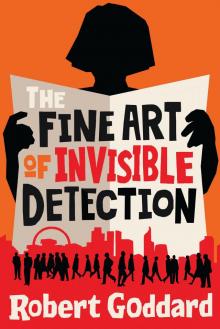 The Fine Art of Invisible Detection
The Fine Art of Invisible Detection One False Move
One False Move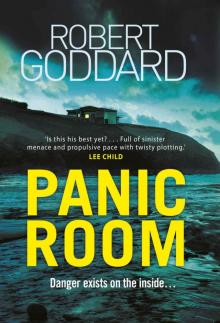 Panic Room
Panic Room Beyond Recall
Beyond Recall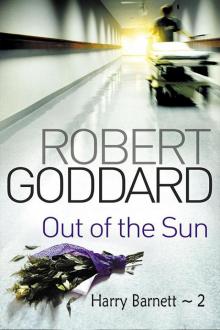 Out of the Sun
Out of the Sun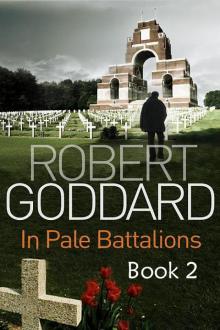 In Pale Battalions - Retail
In Pale Battalions - Retail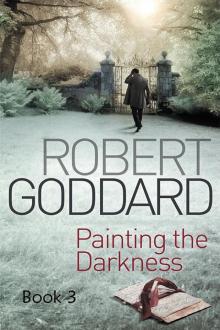 Painting The Darkness - Retail
Painting The Darkness - Retail The Corners of the Globe
The Corners of the Globe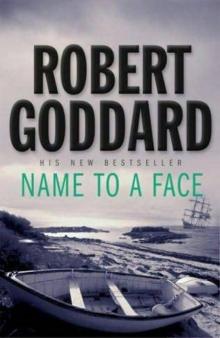 Name To a Face
Name To a Face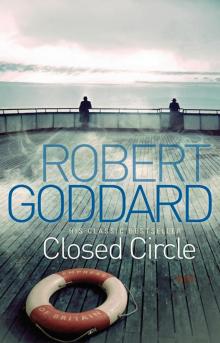 Closed Circle
Closed Circle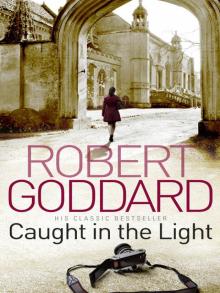 Caught In the Light
Caught In the Light Into the Blue
Into the Blue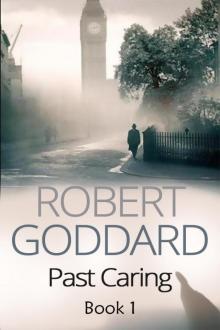 Past Caring - Retail
Past Caring - Retail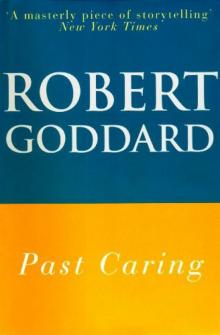 Past Caring
Past Caring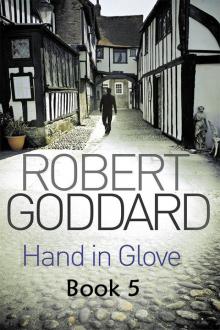 Hand In Glove - Retail
Hand In Glove - Retail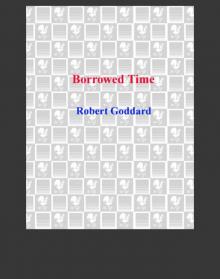 Borrowed Time
Borrowed Time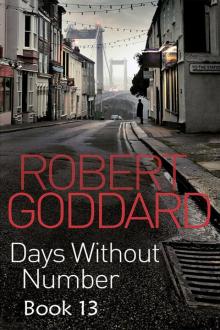 Days Without Number
Days Without Number James Maxted 03 The Ends of the Earth
James Maxted 03 The Ends of the Earth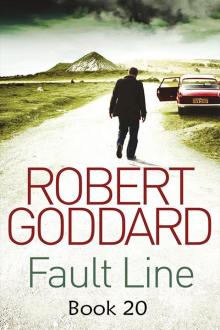 Fault Line - Retail
Fault Line - Retail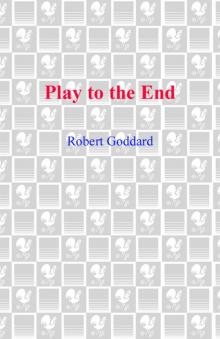 Play to the End
Play to the End Sea Change
Sea Change Never Go Back
Never Go Back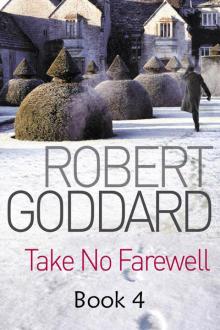 Take No Farewell - Retail
Take No Farewell - Retail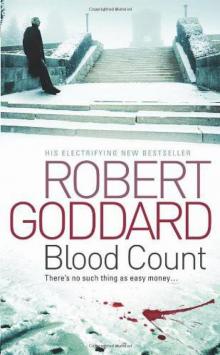 Blood Count
Blood Count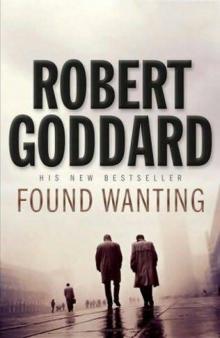 Found Wanting
Found Wanting Sight Unseen
Sight Unseen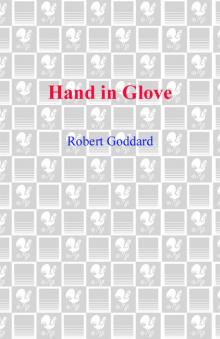 Hand in Glove
Hand in Glove The Ways of the World
The Ways of the World